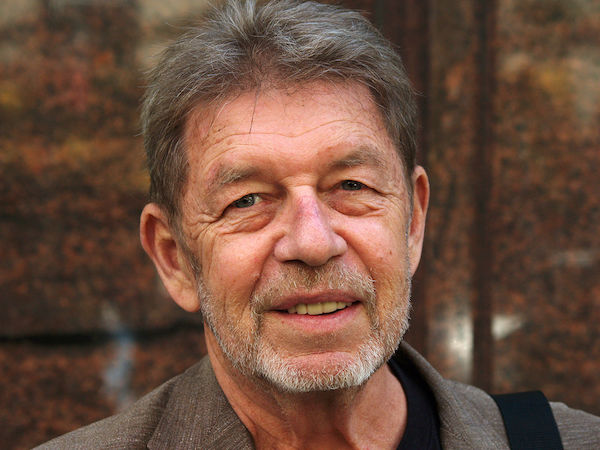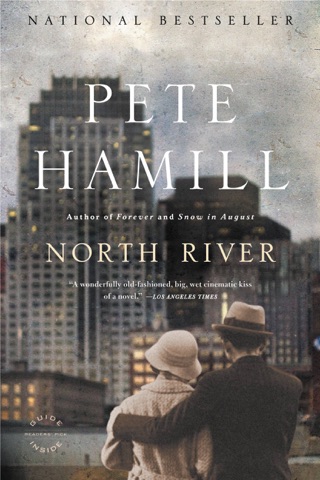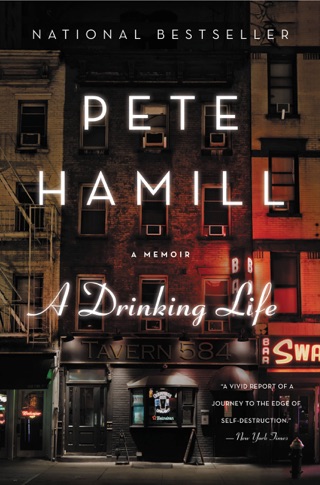Author Remembrance: Writer Pete Hamill — Sane, Liberal, and Literate
By Harvey Blume
The blogosphere might be very useful as propaganda or as therapy. But it’s not journalism.

The late Pete Hamill. Photo: Wiki Commons/ David Shankbone.
The late Pete Hamill, whether in the NY Post (a liberal tabloid then) or the Daily News, was regular reading in the Brooklyn house where I grew up. He died at the age of 85 on August 5. Hamill was a sane, liberal, and literate interlude between the overstuffed, and at the time, rightist Times, and the myriad number of newspapers NYC supported at the time.
What pleasure, then, to chat with him decades later for his fine novel North River (2007), though his acclaimed memoir A Drinking Life might be the best place to start with him.
I’m sorry he’s gone but glad I got to appreciate him on the page and in person. The world he’s from may be gone but Hamill does a memorable job reflecting on and representing it, in terms that matter still today.
I, for one, looking the interchange over, especially value the distinction he makes between nostalgia and sentimentality.
And also what he says about the Iraq War.
Originally appeared in the Boston Globe, June 10, 2007

New York City has been Pete Hamill’s beat for decades, and not a few of its residents are aware of that. When Hamill and I stepped out of a diner south of Union Square in Manhattan last Sunday, a woman got off her bicycle, pointed at him, and exclaimed: “You! How are you!? I love your books!” After complimenting the bicyclist on her flashy helmet, Hamill said he had a new book — North River — coming out. She already knew, she said, and couldn’t wait to get it.
North River, Hamill’s 10th novel, is set in Manhattan during the Depression, and from the title on in, it is grounded in New York City history: North River was common parlance for the Hudson until the 1950s. Hamill has also written 10 works of nonfiction, including the superb memoir A Drinking Life (1994), which tells of his growing up in Brooklyn, where he was born in 1935; his passion for baseball (the Dodgers, if you didn’t know), books, and art; and, above all, his longing for a broader life than the Depression would allow his Irish immigrant parents to achieve (or that drinking, which he gives up in the course of the book, would allow him to sustain).
Journalism was Hamill’s point of entry into that life. He started in 1960 as a gofer-cum-reporter for the then-liberal New York Post, and over the course of his career wrote columns for and edited that newspaper (regular reading in my Brooklyn household growing up) and edited the Daily News. His book, News Is a Verb: Journalism at the End of the Twentieth Century (1998), is a primer on the newspaper business, and an expression of his anxieties about its prospects.
Papers are woven into his other books. In North River, for example, they provide context: “The newspapers: 400,000 on relief in New York, Hitler ranting in Germany, fighting in China, a volcano in Mexico.” One or another of the city’s dailies gets at least passing mention on most every page.
When I brought this up with Hamill, he said, “Sure. There was no television, no all-day radio. You basically lived with newspapers. Everybody.” He added that the newspaper business gave him a “long good time, the best way to live a life that I can think of.”
I asked if the newspaper business today still had enough vitality to offer journalists that kind of life.
Hamill: I think it does. Papers have a function now that they didn’t have before, a verifying function. The blogosphere might be very useful as propaganda or as therapy. But it’s not journalism.
Arts Fuse: Do you use the Internet?
Hamill: I’ve only read Moby Dick once. I’m not going to squander reading time combing the blogs instead. Of course, the Internet has got great tools. How we lived without Google all those years I don’t know.
The downside is too many young guys think if they’ve worked the Internet they’ve done the reporting. But there has to be a time when you get out of the building, you go to the place, you look at the thing.
The kind of columns we wrote, the authority depended on the reporting. You went there, you looked at it, you could have the right to some kind of opinion.
And the blogosphere is unpaid and unedited. There’s no editor leaning over your shoulder saying, that third paragraph really should be the second.
AF: Editors — can’t live with them, can’t live without them.
Hamill: But you’ve got to have them. Particularly with young reporters, the way you learn best — because it’s a craft — is not in the classroom but from another craftsman.
And I’m afraid that with the blogs you become an opinion maven before you’ve done the reporting, and have understood from reporting how complicated the world is.
AF: In News Is a Verb you write that nobody on the subway reads papers anymore. Today, coming in from Brooklyn, the car was full, and there were three papers, one Asian, the other Spanish, and one copy of the New York Post. But is the Post really a newspaper?
Hamill: I think with both the Post and the News the great danger is they will vulgarize and cheapen the news to the point of making a business mistake. Because if people don’t believe the news stories, why should they believe the ads?
AF: This is going to run in a Boston paper. But the line I have in my head is that Pete Hamill is a New York story.
 Hamill: In many ways that’s true, but I’m not unique. I’m one of those people who was able to absorb the opportunities of the city.
Hamill: In many ways that’s true, but I’m not unique. I’m one of those people who was able to absorb the opportunities of the city.
The generation I’m part of — I’m 10 when World War II ended — had years of Depression plus war. It wasn’t that we wanted to go back to what was before the war. That was horrible.
So when it all ended, it gave a lot of us a sense of optimism about the world. We could do anything, which leads inevitably to the kind of thing that made it possible to do anything, the GI bill, which changed blue-collar America more than any other piece of social legislation after the early New Deal. It meant you could go off — the son of a Jewish cabdriver, an Irish factory worker — you could go to Yale and read Spinoza too.
AF: Do you think the decline of newspapers has something to do with the Iraq War?
Hamill: No.
AF: How do you understand this war?
Hamill: It’s about Bush being so stupid as not to imagine the consequences of his action. That’s common to these rich types. Because they didn’t grow up in Brooklyn, where you know if you punch some guy in the mouth, he’s going to come back with three other guys and punch you back. These people — Bush, Cheney — lead well-defended lives.
AF: Are you nostalgic?
Hamill: The most powerful emotion in New York is nostalgia. Not sentimentality. I’m not talking about that. It’s caused by two things. One is the physical changes that go on because of the religion of real estate. You go away for the summer, you come back and your favorite coffee shop is erased. The other is because of the immigrants, people who came from some old country, whatever it is, and never wanted to go back, and had nostalgia for it anyway.
AF: But nostalgia is not a good thing, is it?
Hamill: So long as it’s genuine, based on real loss, it’s very human. I can regret Ebbets field being torn down. That’s genuine because I was in it.
Sentimentality is a false sense of self. You create a kind of Norman Rockwell myth and miss what was truly valuable about your own time on the planet. Sometimes it takes a while to know what that is.
AF: What are you working on now?
Hamill: A novel. I’m about 100 pages in. I’ll be distracted from it for about a month, touring for North River. But I can’t complain about that. It’s not like being sent to Falluja.
Harvey Blume is an author—Ota Benga: The Pygmy At The Zoo—who has published essays, reviews, and interviews widely, in The New York Times, Boston Globe, Agni, The American Prospect, and The Forward, among other venues. His blog in progress, which will archive that material and be a platform for new, is here. He contributes regularly to The Arts Fuse, and wants to help it continue to grow into a critical voice to be reckoned with.
